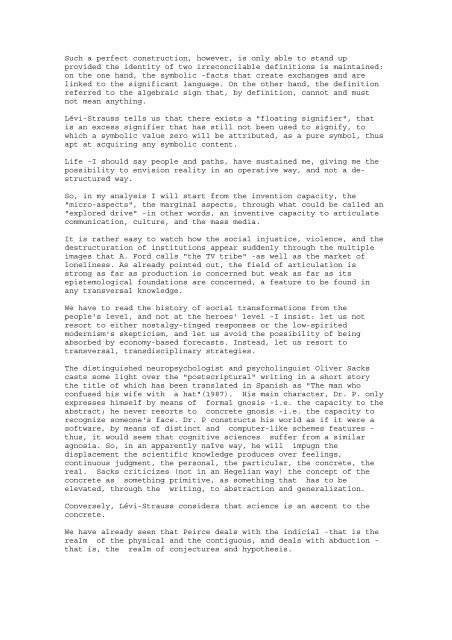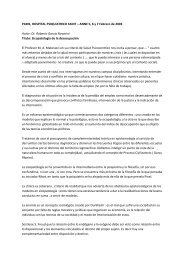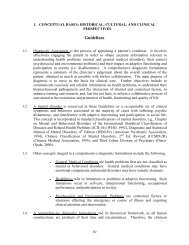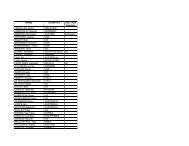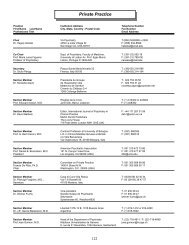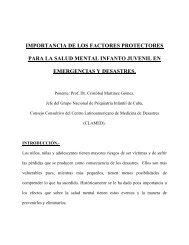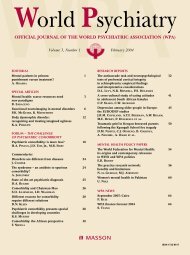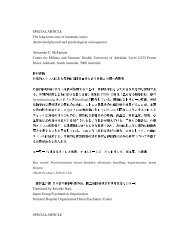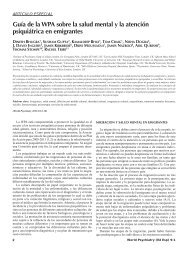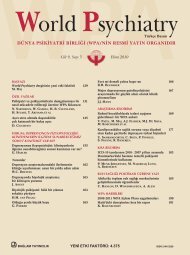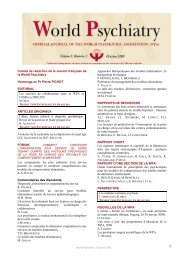<strong>media</strong> <strong>with</strong> an eulogy for <strong>the</strong> <strong>media</strong> is important. Or criticize <strong>with</strong>outany knowledge about <strong>the</strong> <strong>media</strong> <strong>and</strong> <strong>the</strong>ir <strong>relationship</strong> <strong>with</strong> people isalso important.So, it is also important to take into account both a social<strong>mass</strong><strong>media</strong>tization, as well as an alternative-oriented opposition tothis, in order to avoid that studies on <strong>mass</strong> <strong>media</strong> do not dodge<strong>culture</strong> <strong>and</strong> communication policies -because that would be a "nice"way for not exploring here <strong>the</strong> social injustice comes from.It should be taken into account that <strong>the</strong> ups <strong>and</strong> downs we can observein <strong>the</strong> constitution of <strong>the</strong> <strong>culture</strong>-communication-plus-<strong>media</strong> realm arereal strong when it comes to production while, however, <strong>the</strong>y are weakas far as <strong>the</strong>ir epistemological foundations are concerned -acharacteristic, at that, of <strong>the</strong> so-called transversal knowledge, <strong>and</strong>this we say <strong>with</strong>out falling into <strong>the</strong> <strong>postmodern</strong> skepticism.Peirce speaks about: a) <strong>the</strong> indicial, that is <strong>the</strong> realm of body <strong>and</strong>contiguity, <strong>and</strong>: b) <strong>the</strong> educational, that is <strong>the</strong> realm of conjecture<strong>and</strong> hypo<strong>the</strong>sis, a non-deductive <strong>and</strong> non-inductive territory. Both areimportant for studying <strong>the</strong> <strong>media</strong>.In a connected consideration, M. McLuhan says that our currentelectronic times <strong>with</strong> <strong>the</strong>ir unavoidable evocation of simultaneitypresents a first, serious threat to <strong>the</strong> 2,500-year long predominanceof <strong>the</strong> left hemisphere.Thus, we should not be surprised when we seethat students whose right hemisphere has been TV-educated for 18 yearsface problems when dealing <strong>the</strong> <strong>the</strong> left hemisphere-conceived schoolprograms.Indeed, <strong>with</strong>in <strong>the</strong> current strings of dislexia <strong>and</strong> o<strong>the</strong>r <strong>culture</strong>linkeddifficulties, 90% of victims are men. These problems are adirect result from <strong>the</strong> pressure that not only TV but also o<strong>the</strong>relectronic <strong>media</strong> exert on us <strong>with</strong> <strong>the</strong> idea that we come back to <strong>the</strong>right hemisphere.Kerckhov points out that <strong>the</strong> virtual image accepts a point of view butthis is not a once-<strong>and</strong>-for-all process or, in o<strong>the</strong>r words, an imagebecoming a stable <strong>and</strong> reliable reference. The image of <strong>the</strong> body thatei<strong>the</strong>r an interactive screen or a virtual mirror reflect is not <strong>the</strong>image of a unique being. It is <strong>the</strong> image of an open , protean,tentacular net people go through.F. Roustang states that, as can beexpected, Lévi-Strauss, as an anthropologists, stays <strong>with</strong>in <strong>the</strong> social<strong>and</strong> collective field. Lévi-Strauss, however, opens <strong>the</strong> way that Lacanwill take in <strong>the</strong> future, when he says that, as this is <strong>the</strong> case <strong>with</strong>language, <strong>the</strong> social field is an autonomous reality; symbols are morereal than <strong>the</strong> things <strong>the</strong>y symbolize. The signifier both precedes <strong>and</strong>determines <strong>the</strong> signifié. So, Lévi-Strauss establishes <strong>the</strong> autonomy ofa concept that, in <strong>the</strong> future, Lacan will name "<strong>the</strong> symbolic".Thereafter, Lévi-Strauss will resort to <strong>the</strong> structural linguistics toput in ma<strong>the</strong>matical terms <strong>the</strong> unconscious mental structures that canreached at through institutions or, better, by means of <strong>the</strong> language.Thus, it would be sufficient to replace "institutions" by both Oedipus<strong>and</strong> <strong>the</strong> law. Thanks to such a way of expressing ma<strong>the</strong>maticallylanguage aspects which reveal <strong>the</strong> unconscious, Lévi-Strauss considersthat excluding everything pertaining to feelings, desires, <strong>and</strong>believes is possible. Psychoanalysis allows <strong>the</strong> same -i.e. gettingmore involved <strong>with</strong> all that enhances affects, imagination, that whichhas been lived, <strong>the</strong> unspeakable, <strong>the</strong> unfathomable.
Such a perfect construction, however, is only able to st<strong>and</strong> upprovided <strong>the</strong> identity of two irreconcilable definitions is maintained:on <strong>the</strong> one h<strong>and</strong>, <strong>the</strong> symbolic -facts that create exchanges <strong>and</strong> arelinked to <strong>the</strong> significant language. On <strong>the</strong> o<strong>the</strong>r h<strong>and</strong>, <strong>the</strong> definitionreferred to <strong>the</strong> algebraic sign that, by definition, cannot <strong>and</strong> mustnot mean anything.Lévi-Strauss tells us that <strong>the</strong>re exists a "floating signifier", thatis an excess signifier that has still not been used to signify, towhich a symbolic value zero will be attributed, as a pure symbol, thusapt at acquiring any symbolic content.Life -I should say people <strong>and</strong> paths, have sustained me, giving me <strong>the</strong>possibility to envision reality in an operative way, <strong>and</strong> not a destructuredway.So, in my analysis I will start from <strong>the</strong> invention capacity, <strong>the</strong>"micro-aspects", <strong>the</strong> marginal aspects, through what could be called an"explored drive" -in o<strong>the</strong>r words, an inventive capacity to articulatecommunication, <strong>culture</strong>, <strong>and</strong> <strong>the</strong> <strong>mass</strong> <strong>media</strong>.It is ra<strong>the</strong>r easy to watch how <strong>the</strong> social injustice, violence, <strong>and</strong> <strong>the</strong>destructuration of institutions appear suddenly through <strong>the</strong> multipleimages that A. Ford calls "<strong>the</strong> TV tribe" -as well as <strong>the</strong> market ofloneliness. As already pointed out, <strong>the</strong> field of articulation isstrong as far as production is concerned but weak as far as itsepistemological foundations are concerned, a feature to be found inany transversal knowledge.We have to read <strong>the</strong> history of social transformations from <strong>the</strong>people's level, <strong>and</strong> not at <strong>the</strong> heroes' level -I insist: let us notresort to ei<strong>the</strong>r nostalgy-tinged responses or <strong>the</strong> low-spiritedmodernism's skepticism, <strong>and</strong> let us avoid <strong>the</strong> possibility of beingabsorbed by economy-based forecasts. Instead, let us resort totransversal, transdisciplinary strategies.The distinguished neuropsychologist <strong>and</strong> psycholinguist Oliver Sackscasts some light over <strong>the</strong> "postscriptural" writing in a short story<strong>the</strong> title of which has been translated in Spanish as "The man whoconfused his wife <strong>with</strong> a hat"(1987). His main character, Dr. P. onlyexpresses himself by means of formal gnosis -i.e. <strong>the</strong> capacity to <strong>the</strong>abstract; he never resorts to concrete gnosis -i.e. <strong>the</strong> capacity torecognize someone's face. Dr. P constructs his world as if it were asoftware, by means of distinct <strong>and</strong> computer-like schemes features -thus, it would seem that cognitive sciences suffer from a similaragnosia. So, in an apparently naïve way, he will impugn <strong>the</strong>displacement <strong>the</strong> scientific knowledge produces over feelings,continuous judgment, <strong>the</strong> personal, <strong>the</strong> particular, <strong>the</strong> concrete, <strong>the</strong>real. Sacks criticizes (not in an Hegelian way) <strong>the</strong> concept of <strong>the</strong>concrete as something primitive, as something that has to beelevated, through <strong>the</strong> writing, to abstraction <strong>and</strong> generalization.Conversely, Lévi-Strauss considers that science is an ascent to <strong>the</strong>concrete.We have already seen that Peirce deals <strong>with</strong> <strong>the</strong> indicial -that is <strong>the</strong>realm of <strong>the</strong> physical <strong>and</strong> <strong>the</strong> contiguous, <strong>and</strong> deals <strong>with</strong> abduction -that is, <strong>the</strong> realm of conjectures <strong>and</strong> hypo<strong>the</strong>sis.


